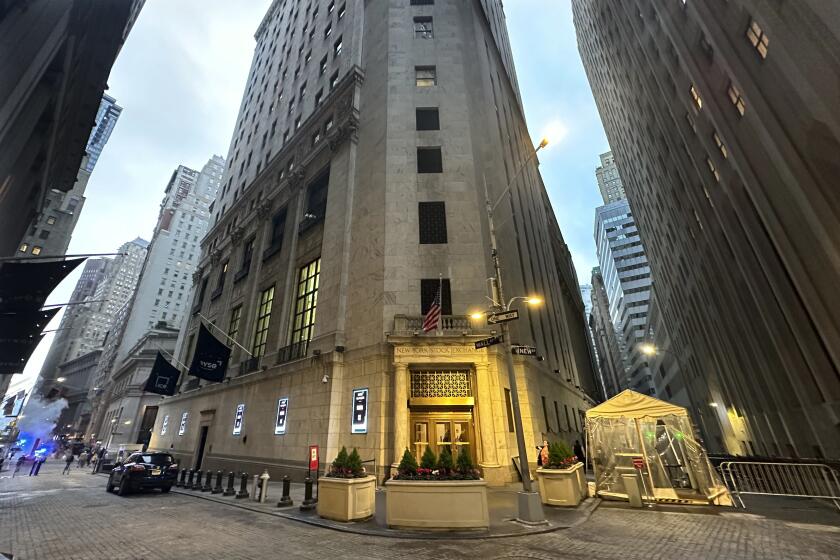Levi Is Slowly Turning the Corner on Revenue
Levi Strauss & Co.’s finances are starting to look a little less blue.
The 150-year-old maker of blue jeans and casual apparel said Monday that its sales increased 2% to $1.26 billion in the fourth quarter to give the San Francisco-based company two consecutive quarters of rising revenue for the first time since 1996. Net income shriveled during the period, however.
Company executives told Wall Street that several new initiatives, including a line of low-priced jeans set to be sold this fall by Wal-Mart Stores Inc., combined with an updated, more fashion-conscious version of Levi’s venerable “red tab” pants, will push sales 2% to 5% higher this year.
“Our turnaround is on track,” Phil Marineau, chief executive of the privately held concern, said in a conference call.
What threw one of the nation’s best-known brand-name companies off track was intense competition in the jeans market and the fact that the bulk of its apparel was made in the United States. Its rivals were able to gain an advantage by moving their production overseas.
So last year, Levi packed up most of its U.S. manufacturing and shipped it to cheaper foreign locales. It shuttered six U.S. factories and two in Europe and laid off 3,900 workers. Today, Levi has most of its products made in Asia and Latin America.
“The closures have helped us be more competitive. We expect to realize about $100 million in savings annually, which is being reinvested in the business,” company spokeswoman Linda Butler said.
Nonetheless, Levi continues to see its profit slide. Its fourth-quarter net income dropped 29% to $45 million compared with the $63 million it earned in the same period a year earlier.
If not for restructuring charges -- Levi recorded $16 million in expenses for closing the eight factories -- the apparel company’s profit would have dipped 13% to $52 million in the quarter versus $60 million in the 2001 period.
For the year, net income plunged 84% to $25 million, compared with $151 million in 2001.
Excluding restructuring charges and related expenses, net income fell 24% to $112 million in 2002 from $148 million the year before.
Sales for the year fell 3% to $4.14 billion, continuing a string of declines from a high of $7.14 billion in 1996.
Last week, Moody’s Investors Service raised its rating on $1.3 billion of Levi’s debt one notch to B3 from Caa1. It was Moody’s first credit upgrade for Levi since 1999.
Even with the upgrade, Levi’s debt remains classified as high-risk “junk” bonds. The credit rating service cited an improvement in the company’s liquidity from the recent issuance of $425 million in senior unsecured notes and other positive business trends.
Levi will debut its “Type 1” jean that highlights its trademark features -- including pocket stitching and rivets -- with a 60-second ad during the Super Bowl this month. And in June, Levi will start to ship a new “Signature” brand of jeans to 3,000 Wal-Mart stores in a major initiative to regain back-to-school sales.
Levi also is marketing low-rise jeans and other trendy designs to fashion-conscious teens.
Although the company maintains that these initiatives will fuel more sales, especially in the second half of the year -- traditionally Levi’s best period -- Moody’s nonetheless sounded a more cautious note.
“Although the company’s recent results show at least a temporary pause in the long-term downward trend in its sales and volumes, there is no assurance of long-term stability, or that volume in the core business will improve going forward,” Moody’s said in its report.
In choosing to keep Levi’s credit below what is considered investment grade, Moody’s said, its rating reflected “the intense competitive pressures that continue to exist in Levi’s core business, and heightened operational and market risk” related to its Wal-Mart venture.
Some analysts voiced concern during a conference call Monday that Levi’s traditional department store customers, such as May Co., Kohl’s Corp. and J.C. Penney Co., might reduce orders because the discount giant will be stocking Levi’s products.
Company officials said there was no evidence that would happen and they issued an upbeat prognosis for the year. “We’re entering 2003 in good financial condition,” said Chief Financial Officer Bill Chiasson.
“We stabilized the top line in the second half of the year,” he added, “held costs in check and maintained industry-leading gross margins.”







